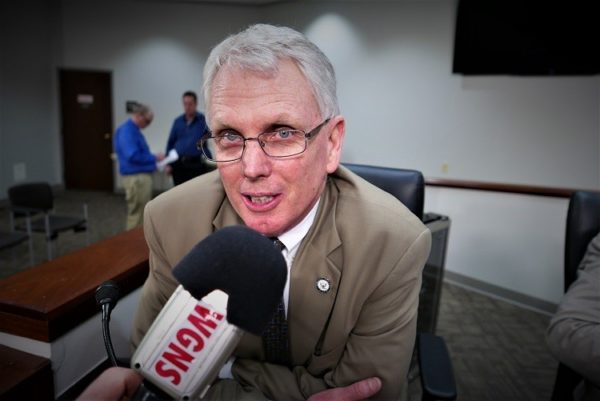
The coffee shop at the back of this Sunset Boulevard book store had the cheapest locally-brewed beer in Los Angeles (short of happy-hour prices). The sign on the wall at Stories said something like, “In case you haven’t noticed, a corporate-owned coffee shop recently opened two doors down. SUCKS. Support locally-owned, small businesses.”
So, while still getting over the sting of a Dodgers beating at the hands of the Cubs just minutes earlier at one of the coolest Major League ballparks in the country, I bought a beer and a book before going across Sunset with the family to Señor Fish, which—to our good fortune—was in the midst of happy hour and had Señor Fish-brewed beer at even lower prices. (LA is a lot better looking after a couple of brews. You don’t notice the trash.)
It was another locally-owned business just down from Vin Scully Avenue, full of character, where we met people from Chicago, Arizona and, of course, LA, and talked about everything from the difference between humid heat and dry heat and even the murder of Steve McNair with some guys who’d been to Nashville, one of whom pulled for the Titans before they were Titans.
In case you’re wondering about the offbeat introduction in a column usually dedicated to news, it’s a tip of the hat to all of those small, locally-owned businesses all across the country—from the West Coast to Murfreesboro—where people put their own style into the product, spending every day of their lives crafting unique tastes, foregoing company benefits and insurance and battling like hell to survive, flourish and finally turn a profit, sort of like the Pulse.
If there’s one thing I’ve learned since leaving one of those massive corporations five years ago, it’s that they really do kind of suck, just like the sign says at the back of Stories. Why such a large piece of our nation depends on the corporate world and 401(k)s for retirement packages is beyond me, when time after time it cuts costs by cutting people. But we do, and it’s probably going to come back to haunt us sometime.
Don’t Look Back, Someone’s Watching
Most Murfreesboroans don’t give a whit whether the police put up cameras along University Street and Reid Avenue to keep an eye on people who might be selling crack.
That bit of information came to light in a recent court hearing involving a May 3 shooting on University Street near Reid Avenue, a place where the faint of heart probably shouldn’t go late at night.
If that’s what it takes to identify the shooter accused of gunning down someone in the middle of the night, so be it. Right?
The question is this: Are we going too far? Are we spying on people? Or do people give up their rights to any semblance of freedom from having a camera on them 24 hours a day when they start dealing dope and shooting people?
And taking this matter a couple of steps further: Have we already given up privacy for safety? No matter where we go in Murfreesboro we are on camera almost all the time. In stores, restaurants and banks, going into government buildings, driving on streets, crossing red-light monitors, etc. we’ve got Big Brother—or somebody’s little brother—watching us.

If you get into big trouble, one of the first things the police will do is check your cellphone, too. They want to know who you’ve called, what your text messages say, whether you have any videos. Oddly enough, people shoot incriminating video, too, not thinking investigators will dig into their phones to find out where they’ve been and what images they’ve been recording. Of course, if they were really smart, they wouldn’t be killing people in the first place.
But getting back to the first question: If police can get by with using surveillance cameras to catch people charged in shootings, what’s to stop them from putting up cameras to find out who’s letting their dogs poop in your neighbor’s flower beds every night? And, make no mistake, we have a big problem in Murfreesboro with dog walkers allowing their pooches to stop and leave a pile on your pansies.
This is serious. People spend countless hours preparing the soil and putting in flowers, not to mention going to Martin’s to shop, and then someone has the gall to let Marmaduke stop to poop. Good Lord, is nothing sacred?
Of course, we could go back to the days when dogs ran loose, constantly threatening kids when they walked down the streets. A dog bit me one day when I was about 10 years old, and the man who owned it just happened to be driving down the street and saw what happened. He took the dog out back and shot it, then drove me home.
These days, police could probably find some surveillance video to catch that type of incident, and the guy likely would be charged with animal cruelty. I could have been an accessory to the crime, too, since my dog bite instigated the shooting, which is all the more reason to worry about being watched from cradle to grave.

New Murfreesboro City Manager Craig Tindall
Nothing New at City Hall
The appointment of former City Attorney Craig Tindall as city manager is business as usual for the Murfreesboro City Council, and that’s not a knock on Tindall.
This is one of the few positions the council fills, and what it really comes down to is a popularity contest.
In the late 1980s, the council hired Roger Haley when Clyde Fite retired. Councilman Richard Reeves was in charge of the search and put together a short list of candidates, including Haley, whose equipment rental business, Mr. Tool, was flagging at the time.
The council wound up hiring Haley, who held a firm rein on city business for nearly 20 years. The only requirement, requested by the late council member Mary Huhta, was that he immediately divest himself of his business. It must be noted this was in the midst of an economic downturn, and a lot of business people were struggling.
Anyway, council members were comfortable with Haley when they gave him the job, and he stuck for a long time, though—I must admit—there were a couple of times when I thought he should have been fired.
Then came Rob Lyons, who worked as assistant city manager for several years before getting the big job. Council members were comfortable with him. They liked the way he handled the city’s response during the Good Friday tornado, and he hung tight for about a decade until he started wearing on council members’ nerves and decided to step down or be forced out.
The same is true with Tindall. Council members are comfortable with him. He’s not nearly as temperamental as Haley, and as an attorney by trade he might keep them out of lawsuits.
Compared to the list of inexperienced candidates put together by a consultant in a supposed national search, Tindall looked like Superman.
You have to wonder, though, how long he will last before he starts getting on their bad side. Once a council member gets pissed off about a bad city manager decision, it’s only a matter of time.













